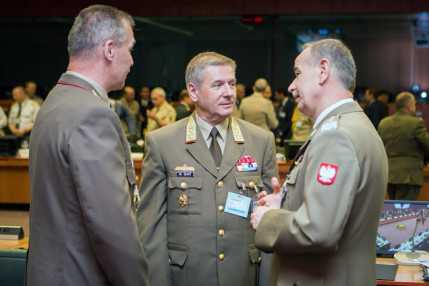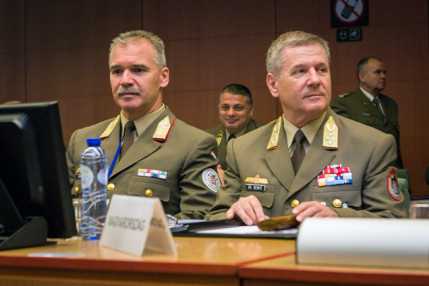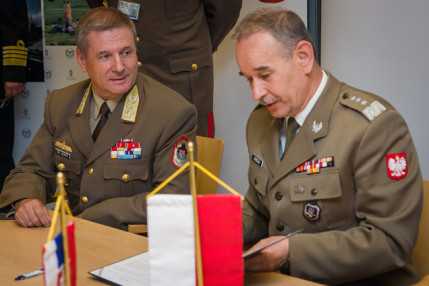General Tibor Benkő Offers Participation in Exercise To Be Conducted in Hungary
Szöveg: honvedelem.hu/MTI | 2014. május 24. 7:54“Hungary has invited several NATO member and NATO partner countries to participate with troops in the exercise of a battalion-sized infantry battle group to be conducted in Hungary next year” – Gen. Dr. Tibor Benkő, the Chief of the Defence Staff told journalists in Brussels on Thursday, May 22 after attending a three-day meeting of chiefs of defence from EU and NATO member countries.

Currently Hungary is the presidency nation of the Visegrád Group (V4) which comprises Hungary, Poland, the Czech Republic and Slovakia. In his related capacity – as the V4 chiefs of defence have reached a consensus on this matter – , Gen. Tibor Benkő proposed that next year, the certification exercise of the V4 Battle Group – which is to be formed soon and to reach full operational capability (FOC) by the first half of 2016 – should also be joined to the NATO exercise Trident Juncture 2015. Although the V4 Battle Group is to be set up within the European Union, every Visegrád Four country is a NATO and EU member state.
The Hungarian Chief of Defence said that Ukraine had agreed to contribute helicopter and strategic airlift capacity to the formation of the V4 Battle Group. All these plans fall into line with the Atlantic Alliance’s wanting to show the flag (with partner nations involved) in response to Russia’ aggression in Ukraine and increasing the combat readiness of its forces, mainly in the eastern region of Europe.
“We need to have concrete, rapidly deployable response forces which we can use by common assent, and the formation of European battle groups serves this purpose", Gen. Dr. Tibor Benkő told journalists. He was of the opinion that the lessons drawn from Russia’s behavior call into question the correctness of an earlier approach which dominated NATO’s and Hungary’s military strategies, and “made decision-makers become too comfortable". This approach emphasized that there was no threat of any conventional attacks in the foreseeable future. “This thesis may well be true even today, but what happened in the Crimea was not an annexation carried out with conventional means", the general noted.

He also said that according to figures released at the Brussels meeting, Russia has increased its military spending by 50 per cent since 2008, while NATO has reduced its total defence spending by 20 per cent, and this trend is clearly unacceptable.
At their Tuesday meeting, the EU chiefs of defence discussed EU-led military operations. Speaking about Operation EUFOR ALTHEA conducted in Bosnia-Herzegovina, Gen. Benkő said the troop contributing nations had come to a conclusion that peacekeeping in the Western Balkan country promises to be a protracted process. There is a continuing need for international forces, because we cannot rule out the possibility of riots erupting in the wake of the elections which are due at the end of the year. In a given case, there may be a need to reinforce of Operation EUFOR ALTHEA", the Hungarian Chief of Defence added.

Photo: Defence Staff